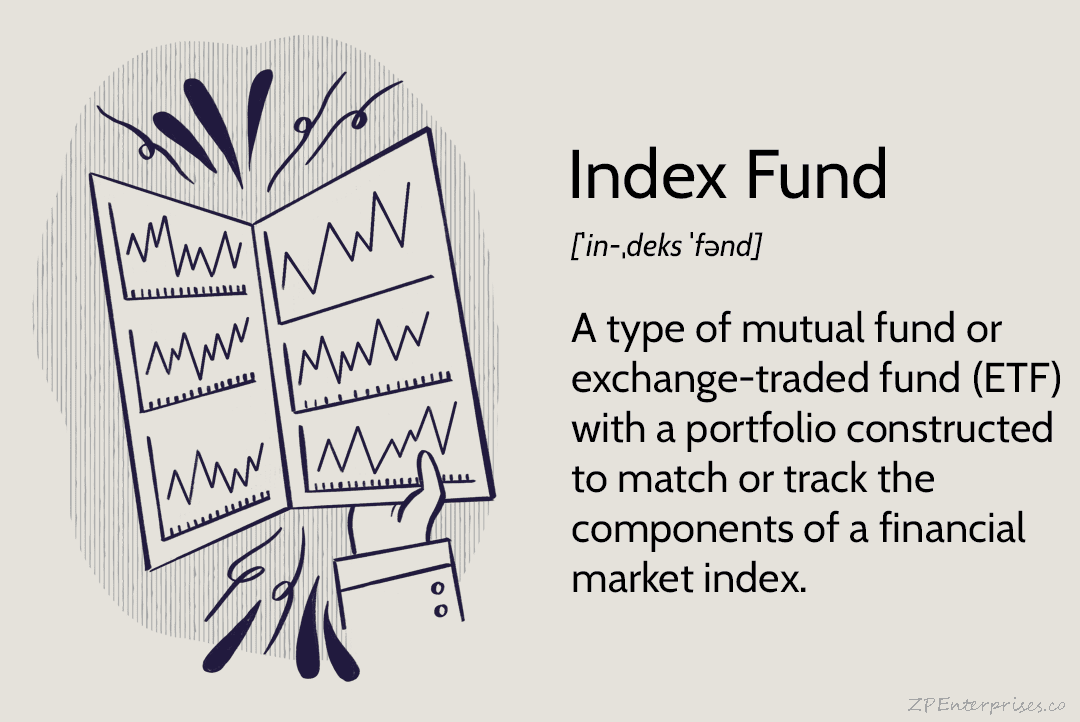Index funds are passively managed mutual funds that try to duplicate the performance of a financial index, like the S&P 500 or the Dow Jones Industrial Average. Index funds are a great way to simplify investing while also reducing your costs. You can buy index funds through your 401(k), individual retirement account (IRA), or an online brokerage account. Read on to learn about index funds and whether they’re a good fit for your portfolio.
What Is an Index and Why Do They Matter for Index Funds?
An index measures the performance of a large group of assets of a similar type, such as stocks, bonds, currencies, or commodities. Indexes factor together the prices of a wide range of assets, helping people track their market performance as a group more easily.
For example, the S&P 500 is an equity index consolidating the stock prices of 500 of the largest publicly traded U.S. companies. The S&P 500 makes it easy to understand whether the leading U.S. stocks are gaining or declining in value. Other stock market indexes include the Nasdaq Composite and the Russell 2000.
There are indexes for nearly every asset class and almost every sector of the economy. They track the performance of large-cap or small-cap stocks, investment-grade or junk bonds, and every kind of commodity. Indexes track foreign currencies and international companies. The list goes on and on.
Index fund managers build asset portfolios that attempt to earn the same returns as a chosen index. For example, an index fund that targets the S&P 500 would buy the stocks that comprise the index and attempt to match the overall performance of the S&P 500.
How Do Index Funds Work?
As noted above, index funds are a type of mutual fund. Like all mutual funds, you’re pooling your money with other investors when you buy shares in an index fund. With an index fund, the pool of money is used to purchase a portfolio of assets that duplicate the performance of a target index. Dividends, interest, and capital gains are paid out to investors regularly.
The fund manager adjusts the share of the assets in their portfolio to match the index. By doing so, the return on the fund should match the performance of the target index before accounting for fund expenses.
Why Index Weighting Matters for Index Funds
Indexes use different weighting strategies to track their underlying assets, and the choice can greatly impact how an index fund performs. A price-weighted index considers each asset’s market price: Higher-priced assets have a more significant share in the index than lower-priced assets. The Dow Jones Industrial Average (DJIA) is a price-weighted index: The price per share of each company tracked by the DJIA determines its weighting in the index.
Meanwhile, a market-cap weighted index considers each asset’s market capitalization—the total money invested in the asset or the so-called market cap—to determine its share in the index. The S&P 500 is a market-cap-weighted index: Each component company’s market capitalization determines its index weight.
Why does this matter? A fund that tracks a price-weighted index needs to adjust its portfolio holdings more frequently, as market prices fluctuate, to keep up with its target index. With market-cap weighting, there is less need for buying and selling to keep the fund aligned with its target. However, large-cap assets can impact the index’s performance and any fund based on it.
An equal-weight index gives the exact weighting in its calculation to each asset it tracks, independent of its price or market cap, large or small. For an index fund, that means no single holding has an outsized impact—positive or negative—on performance.
Index Funds Are Passive Investments
Index funds are passively managed investments. There is debate over the virtues of actively managed mutual funds vs. passive index funds, but there’s a solid case to be made that passively managed index funds are less expensive and may have better returns over the long term.
Managers of actively managed mutual funds attempt to outperform a benchmark index. For example, an actively managed fund that measures its performance against the S&P 500 would try to exceed the annual returns of that index via various trading strategies. This approach requires more involvement by managers and more frequent trading—and, therefore, higher potential costs.
Passive management doesn’t try to identify winning investments. Instead, managers of an index fund merely attempt to duplicate the performance of their target index. This strategy requires fewer organizational resources and less trading, which means index funds usually charge lower fees than actively managed mutual funds.
Advantages of Index Funds
- Low fees. Index funds charge lower fees than actively managed mutual funds. Fund managers merely track an underlying index, requiring less effort and fewer trades than actively attempting to beat a benchmark index.
- Easy diversification. When you buy shares of a single index fund, you gain access to an investment portfolio of a very large basket of securities. The time and expense of building and maintaining a similar portfolio would likely be prohibitive.
- Long-term growth potential. Over the past 90 years, the S&P 500 has earned an average return of nearly 10% per year. That’s one of the highest returns of any investment and one that even professional investors struggle to beat. By buying into an S&P 500 or other equity index fund, your investments are set to grow for the long term.
Disadvantages of Index Funds
- Average annual returns. Index funds may provide a high degree of diversification but also deliver only average annual returns. Index funds can dilute the possibility of significant gains, driven by the combined results of a large basket of assets.
- Little chance for significant short-term gains. As passive investing vehicles, there’s little scope for capturing significant short-term gains with index funds. While this is more of a feature of index funds, not a bug, investors seeking sizable short-term gains should not expect them from index funds.
